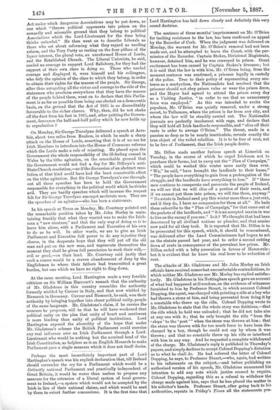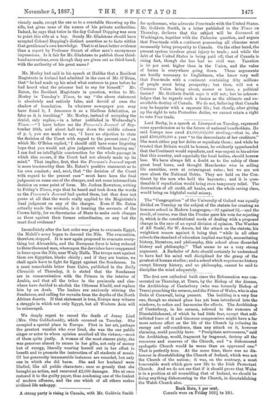The attacks of Mr. Gladstone and Mr. John Morley on
Irish officials have received somewhat uncomfortable contradictions, to which neither Mr. Gladstone nor Mr. Morley has replied satisfac- torily. Mr. Gladstone in his Nottingham speech gave an account of what had happened at Gweedore, on the evidence of witnesses furnished to him by Professor Stuart, in which account Colonel Bopping, the agent, was charged with pointing a rifle at a boy who had thrown a stone at him, and being prevented from firing it by a constable who threw up the rifle. Colonel Bopping wrote to Mr. Gladstone to state that the whole story was fictitious,—that the rifle which he held was unloaded ; that he did not take aim at any one with it ; that he only brought the rifle "from the slope ' to the port " when the stone was thrown at him ; that the stone was thrown with far too much force to have been dis- charged by a boy, though he could not say by whom it was thrown ; and that no constable threw up his rifle or interfered with him in any way. And be requested a complete withdrawal of the charge. Mr. Gladstone's reply is published in Thursday's papers, and simply declines to accept Colonel Dopping's dictation as to what he shall do. He had referred the letter of Colonel Bopping, he says, to Professor Stuart,—who, again, had written to his informants on the subject,—and before publishing an authorised version of his speech, Mr. Gladstone announced his intention to add any note which justice seemed to require. Colonel Bopping, regarding this as a refusal to withdraw the charge made against him, says that he has placed the matter in his solicitor's hands. Professor Stuart, after going back to his authorities, repeats in Friday's Times all the statements pre-
viously made, except the one as to a constable throwing up the rifle, but gives none of the names of his private authorities. Indeed, he says that twice in the day Colonel Doppiug was seen to point this rifle at a boy. Surely Mr. Gladstone should have accepted Colonel Dopping's distinct assertion as to facts within that gentleman's own knowledge. That is at least better evidence than a report by Professor Stuart of other men's anonymous impressions. Is it fair for Mr. Gladstone to publish these third- band accusations, even though they are given out as third-hand, with the authority of his great name ?



















































 Previous page
Previous page